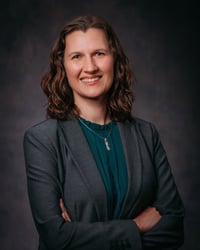
This month I have been thinking a lot about how students, faculty, and staff are transitioning to yet another phase of dealing with COVID-19 (because I am not yet ready to say we are past it) and how that relates to the student success work we need to move forward. I hear a lot of folks starting to talk about being “post-COVID” and that we can now get back to our “normal” work. This gives me pause because the spaces I am in don’t seem to be there yet. Now I don’t mean masks or in-person meeting. I am talking about mentally, emotionally, and physically being ready to engage in a post-COVID level of work. As an institution we need to recognize that our students, faculty, and staff will be dealing with the effects of COVID long past shifting away from high infection levels or daily mask wearing. We will feel these impacts for years to come and need to think about our work with this in mind.
Two things from the last few weeks make me think about this. First, our February Spartan Voice survey showed that students are still dealing with a lot outside of the classroom.
- 78% of students feel stressed or anxious to the point it impacted their ability to focus on their schoolwork
- 30% have difficulty meeting basic food or housing needs
- 27% are providing care for a loved one
- 48% dealing with a personal health situation that impacted their ability to focus on schoolwork
- And due to the structural inequities that exist in our society, all of these are impacting our marginalized students to a greater degree.
Second, the Office of the Provost hosted its academic strategic planning implementation summit last week. As part of this summit, we discussed the great ideas that colleagues came up with to move the five themes of the strategic plan forward. I was encouraged to see that 272 folks attended the webinar and 216 stayed to discuss ideas in a breakout room (with 126 wanting to discuss student success!). But what I also think is important to discuss in this conversation was all the folks who were not able to attend. I had countless colleagues reach out to me to say, “I am so overwhelmed I totally missed the email about this” and “I want to attend but just don’t have the time/emotional bandwidth to invest in this.” Additionally, when we discussed many of the projects both during the summit and after, lots of people shared that while these were really important projects and ideas that they support moving forward with, they just don’t have the time and capacity to engage in it right now.
Yet, our students need us to engage in this work now more than ever. So how do we, as an institution, structure this work moving forward in such a way that understands the heavy workloads and long-term impacts that COVID has had on our ability to engage in this work? How do we give space for those who have limited time, but are passionate about the work? I don’t have all the answers, but I am trying to create different opportunities to be involved. Maybe you can’t lead a workgroup, but would be interested in a small piece of the work and you can join for that small project and then cycle off. Interested, but can’t commit now? No problem. We will add you to the listserve and when you have the time and energy will welcome you into the work.
What have you found to be successful or new ideas you are going to try given this context? I would love to learn from you all as we all strive to reach our strategic goals.